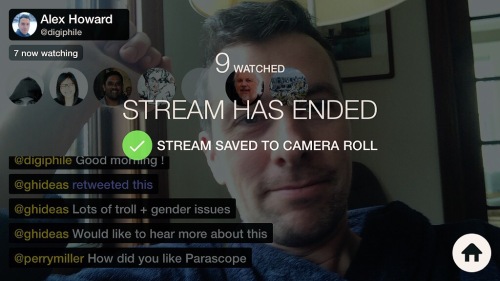
The New York Times “First Draft” and Politico Playbook picked up the “Meerkat Election” idea today, so get ready for the hype cycle to wash through the commentariat. Former Florida governor Jeb Bush “meerkatted” yesterday — which is to say, used an app integrated with Twitter on his smartphone to livestream an event online. If that doesn’t sound revolutionary in 2015, congratulations: you’ve been paying attention to mobile technology over the last decade.
When you read posts that predict Meerkat’s prominence in 2016, keep a couple things in mind.
First, Twitter did change how political reporters covered the campaigns in 2012, so everyone is looking for the “next thing,” particularly in the New York and DC media world. Politicians and media using a shiny new app that “conquered all at SXSW” makes for easy copy and gets clicks. The integration of Meerkat into Twitter means that social network will drive more attention and adoption, although the app’s access to the company’s social graph bears watching. By the time 2016 rolls around, Twitter’s native live streaming function may be the new new killer campaign app. Steel yourself for the “Periscope Election,” friends.
Second, when you hear hype about technology like this breathless account in Politico from political reporters and operatives, be extra skeptical. Remember, 2008 was the “MySpace Election” and 2004 was to be the “Friendster Election. Heck, 1860 was the “Telegraph Election!” (Ok, the last one isn’t quite true, but you get the idea. )
Third, at present Meerkat videos are not archived on the site or embeddable . While that could certainly change in the months before the election, particularly if the startup gets funding, it is a consideration for journalists. That doesn’t mean, however, there isn’t another option: Ben Rubin, the developer of the app, told me that you can save Meerkat streams to your phone and upload the archived session to video sharing platorms like YouTube, an ability I subsequently confirmed.

Finally, livestreaming is not new to American politics. Presidential candidates like Senator Chris Dodd were using uStream in 2008. Ask President Dodd if it changed the election. A couple comments on Medium add some context, including one by Matt Browner Hamlin, who worked on the Dodd campaign.
Livestreaming was available in the last two presidential campaign cycles, but it didn’t fundamentally change our politics. It didn’t even shift the primary in 2008, as Browner Hamlin noted on Medium:
To state the obvious, the Dodd campaign’s innovative use of live streaming technology and public engagement via streaming video did not move the needle an inch in the Democratic presidential primary. Maybe it’s because we were eight years ahead of our time. But more likely it’s because the forces of political sentiment in America are too big to be influenced by one technology platform or one medium of engagement.
A covert video did affect Governor Mitt Romney’s campaign, but the reality of small video cameras had been part of the fabric of our lives for years before.
I wrote this post entirely on my iPhone, so it’s fair to acknowledge that media has evolved in recent years. (I’ve also been guilty of hype about new platforms myself.)
It’s also fair to acknowledge that Meerkat does something that defines innovation: it makes it easier to livestream on your phone.
“I think that because we remove friction to watch or go live (everyone can consume or contribute on the go with one click) it makes it easy for people to gain a larger audience while keeping the intimacy with the audience,” commented Ben Rubin, via email.
Faster connections, powerful smartphones and much high social media adoption do change the context from past election cycles, but will they change the outcomes or the dynamic?
We’ll see. The White House press secretary is doing a Meerkat interview today: maybe someone will ask him whether the size of the lens, camera and screens used to view it are a revolution or an evolution.

Pingback: Twitter puts up its Periscope. Will mass adoption of livestreaming follow? | digiphile
Pingback: RhinoBird.tv launches collaborative livestreaming app for Android users and the Web | digiphile
Pingback: Livestreaming ban in Tennessee House shows how power can limit the right to record | E Pluribus Unum